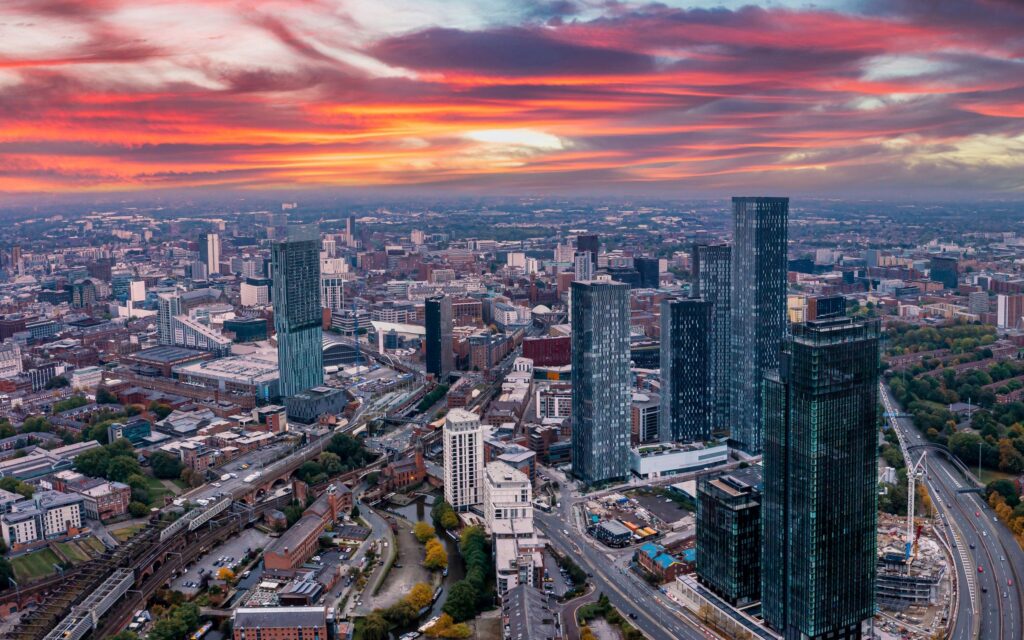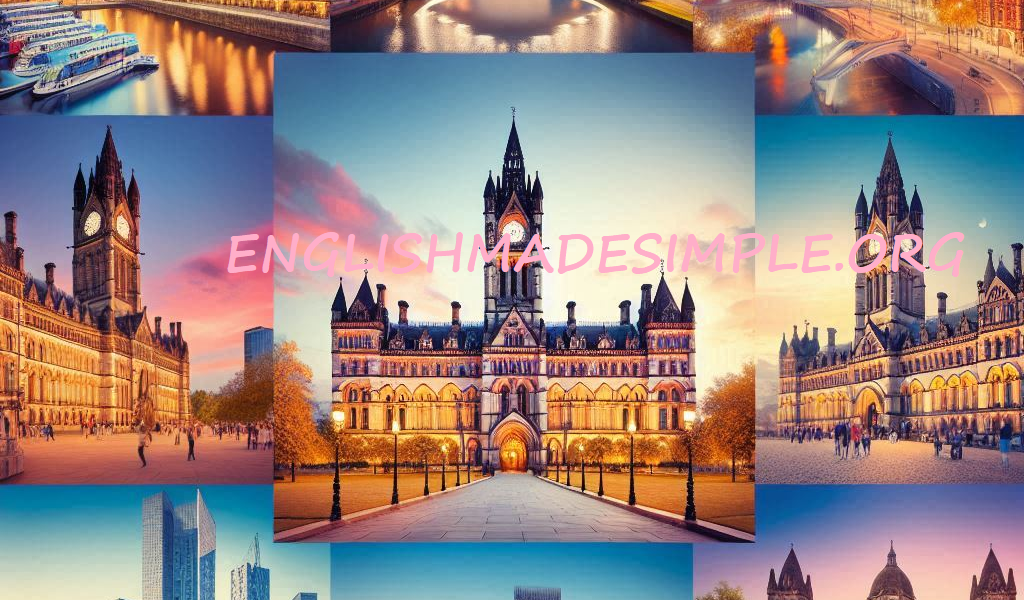Manchester: A City of Industry, Culture and Innovation
Manchester, situated in the north-west of England, is one of the United Kingdom’s most dynamic and historically significant cities. Renowned for its rich industrial heritage, vibrant cultural scene, and progressive spirit, Manchester continues to be a major hub of commerce, education, music and sport. It has evolved from its 19th-century roots as one of the world’s first industrial city into a modern, cosmopolitan urban centre with a global outlook.

Location and Geography
Manchester lies in the county of Greater Manchester, approximately 160 miles (260 kilometres) north-west of London. The city is nestled between the Pennines to the east and the Cheshire Plain to the west. Its geographical position has long made it a strategic location for trade and transportation, with excellent rail, road, and air links. Manchester is served by Manchester Airport, one of the UK’s busiest, which provides direct connections to major cities across Europe, North America, Asia and beyond.
The River Irwell runs through the city, and the Manchester Ship Canal, a significant engineering feat completed in 1894, historically allowed ocean-going ships to reach the city centre, enhancing its status as a key industrial port. Although shipping no longer plays a central role in the city’s economy, the canal and rivers remain defining features of its urban landscape.
Historical Background
Manchester’s history stretches back to Roman times, when it was founded as a fort named Mamucium around 79 AD. For many centuries, it remained a modest market town. It was not until the late 18th and 19th centuries that Manchester rose to prominence, becoming the epicentre of the Industrial Revolution.
Fuelled by the growth of the cotton industry, the city earned the nickname “Cottonopolis.” Manchester became one of the world’s first industrialised cities pioneering advancements in textile manufacturing, engineering and transport infrastructure. The city was also at the forefront of political and social movements, including the Chartist movement and the campaign for workers’ rights. The Peterloo Massacre of 1819, where a peaceful pro-democracy rally was violently suppressed, is a pivotal event in Manchester’s radical political history.
The city’s fortunes declined in the mid-20th century with the collapse of manufacturing, but regeneration efforts from the 1990s onward transformed Manchester into a thriving urban centre once again.
Population and Demographics
According to recent estimates, Manchester has a population of around 580,000 people within its city boundaries, while the Greater Manchester metropolitan area is home to approximately 2.8 million residents. It is the third most populous metropolitan area in the UK after London and Birmingham.
Manchester is known for its cultural diversity and youthful population. The city is home to large communities of South Asian, Afro-Caribbean, Chinese, Middle Eastern and Eastern European descent. This multiculturalism is reflected in the city’s food, festivals, religious institutions and cultural life.
The student population in Manchester is also significant, with over 100,000 students across institutions such as the University of Manchester, Manchester Metropolitan University, and the Royal Northern College of Music. This youthful demographic contributes to the city’s vibrant and innovative character.
Famous Landmarks and Attractions
Manchester boasts an array of iconic landmarks, both historical and modern. One of the city’s most famous buildings is the Manchester Town Hall, an outstanding example of Victorian Gothic architecture located in Albert Square. The John Rylands Library, part of the University of Manchester, is another architectural and cultural gem, housing rare manuscripts and special collections.
The city’s industrial heritage is showcased in venues such as the Science and Industry Museum, which tells the story of Manchester’s contributions to science, technology and industry. The Castlefield area, a designated Urban Heritage Park, features canals, Roman ruins and converted warehouses, offering a glimpse into the city’s industrial past.
Manchester is also known for its music and arts scene. The Manchester Arena hosts major concerts and events, while the Bridgewater Hall is home to the Hallé Orchestra. The HOME arts centre combines theatre, film and contemporary art under one roof.
In recent years, MediaCityUK, located in Salford Quays, has become a major media and digital hub, home to the BBC, ITV and numerous creative enterprises. Nearby is The Lowry, a striking arts complex named after the famous Manchester-born painter L.S. Lowry.
For sports enthusiasts, Manchester is synonymous with football. The city is home to two of the world’s most famous football clubs: Manchester United, whose home is Old Trafford, and Manchester City, based at the Etihad Stadium. Both clubs have large global followings and have contributed significantly to the city’s international profile.
Economy and Industry
Manchester’s economy has undergone a profound transformation since the decline of traditional manufacturing industries. Today, it is one of the UK’s most important economic centres outside London, with a diverse and resilient economy.
Key sectors include finance, professional services, education, digital and creative industries, biotechnology, and advanced manufacturing. The city is home to major financial institutions and firms in areas such as legal services, accountancy and banking. Spinningfields, Manchester’s business district, has become a focal point for finance and commerce.
The digital and technology sector is particularly vibrant. Manchester has earned a reputation as the UK’s “second city” for tech, attracting startups and established firms in software development, data analytics, cybersecurity and e-commerce. Initiatives such as Manchester Science Park and The Sharp Project support innovation and entrepreneurship.
Higher education and research are also crucial to Manchester’s economy. The University of Manchester is a world-renowned research institution and a member of the prestigious Russell Group. It has produced 25 Nobel laureates and plays a leading role in scientific advancement, particularly in fields such as materials science, where the discovery of graphene earned international acclaim.
The city’s strong transport links, including the expanding Metrolink tram system and ongoing investment in rail and high-speed connections, further enhance its economic potential. Manchester is also bidding to be a key player in the UK’s Northern Powerhouse initiative, aimed at rebalancing the national economy by boosting growth in the north of England.
Politics
Manchester, along with much of the north of England, has traditionally been a stronghold of the Labour Party. This longstanding political alignment is rooted in the region’s industrial past, where working-class communities formed the backbone of the economy through industries such as textiles, coal mining and manufacturing. The Labour Party’s focus on workers’ rights, social equality and public services resonated deeply with these communities, leading to consistent electoral support across cities like Manchester, Liverpool, and Sheffield.
In Manchester, Labour has dominated local politics for decades, regularly securing control of the city council and winning parliamentary seats. While political dynamics have begun to shift in some northern areas in recent years, particularly with the rise of alternative parties and changing demographics, Manchester remains a key centre of Labour support and a symbol of the party’s historical connection to the industrial heartlands of Britain. The current British deputy Prime Minister, Angela Rayner is from Manchester.
The Manchester Accent
People from Manchester are called ‘Mancunian’, and the ‘Mancunian’ accent is considered quite distinct. The Manchester accent and dialect, often associated with the broader Mancunian or “Manc” variety of English, is distinctive and easily recognisable within the UK. Characterised by a relatively flat intonation and a somewhat nasal quality, the accent often features a short, clipped pronunciation of vowels. For example, words like “bus” may be pronounced more like “buzz”, and the vowel in “cup” can sound closer to “cook” than in southern accents.
Mancunian English also tends to drop the “g” at the end of “-ing” words, such as “goin'” or “workin'”. The dialect includes a range of unique slang terms, such as “mad fer it” (keen or enthusiastic), “our kid” (a sibling or close relative), “buzzin'” (excited or pleased), and “gaff” (house or home). While younger generations may not use the full range of traditional dialect words, the Manchester accent remains a strong marker of regional identity and pride.
Here is a video about the Mancunian accent.
Conclusion
It is England’s third city and one which likes to view itself as the ‘capital of the north’. Manchester has expanded over the years and greater Manchester now includes areas like Salford which was regarded before as a completely different place and which some still do. However other residents view it as either part of being just Manchester or ‘Greater Manchester’. Mancunians are a proud lot and produced many famous Britons including in the fields of literature, politics, music and others.

